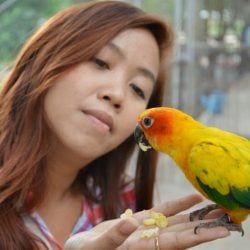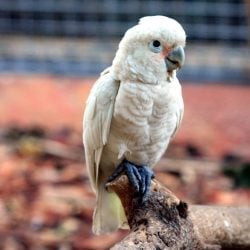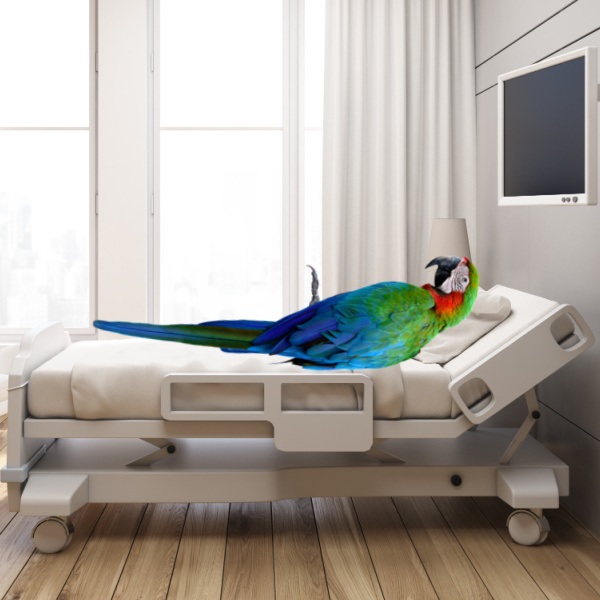
Ten Things to Consider Before Getting a First Bird
Last Updated on by Catherine Tobsing
or adding another parrot to your life
Taking care of a parrot is a lot of responsibility. Most of you already know this but a few may not.
Your friends that don’t own parrots probably look at yours and think they want one too, so please pass these points along to them so they can make a wise decision.
Whether you are buying your first parrot or your 10th, you need to think these things through as well.
Sharing life with a parrot is very much like living with a poorly mannered undisciplined 3 year old who will not grow up and go away to college.
And I am referring to the best-mannered parrot in this comparison. Poorly socialized parrots can be true terrors in a home. So tell your friends that envy your parrot parenthood the real truth about sharing your life with a parrot.
Here are ten things that must be considered before opening your home to a parrot.
Motivation: Why do you want your first or an additional parrot? People all too often take parrots into their homes for the wrong reasons. I’m just as guilty as the rest. I had a budgie I’d recently lost due to her having lived a good long life and passing over the rainbow bridge. I had a cockatiel who was tame but I wanted a bigger bird and one that would ride on my bicycle with me.
My first sun conure picked me but I paid for her thinking she would ride on my shoulder as I rode my bike along the beach. She was TERRIFIED at the very sight of a bicycle. Fortunately, I already knew I loved birds and that hadn’t been my only motivation so we lived happily together until she passed from old age.
But people often purchase a parrot as if buying home decor and they are anything but beautiful silent displays to show off when you want and to put back in the cage when the bird isn’t gaining attention for the owner. Unless you truly want to love a bird and all the associated work, expense, and sometimes heartbreak, then think again about buying or offering a home to a parrot.
Investment and Expenses: Small parrots don’t require a huge initial investment for the actual bird, but by the time you purchase a spacious cage, accessories, toys, first aid, grooming needs, and all the other things needed to keep a bird healthy, happy and busy, you can expect to invest several hundred dollars at a bare minimum. Multiply that amount by 2 to 5 for every extra ounce of parrot (just a guesstimate but likely a close one) as you move into larger parrots.
Everyone thinks they want a cockatoo until they realize the investment is thousands instead of hundreds. Then there is well-bird health care because at a minimum a yearly checkup by an avian vet is mandatory. Many parrots, for example, like Mitch and Catherine’s Popcorn, require trips to the vet often due to health issues, age, and follow-ups due to minor accidents or illnesses, for example, Popcorn’s recent chronic egg laying required lots of vet trips to ensure her health during this challenging period (we all hope that period is over since she has gone through the 72-hour bright light treatment, follow her progress at http://twitter.com/). Birds require replacement toys, cleaning products made for parrots, and buying (or avoiding buying) things based on their safety for parrots without respect to price.
Your Family Structure: Kiwi, my budgie, came to me because his teen owners grew up and went away to college. Young couples need to think about housing deposits if they have a large bird and potential home damage if their bird gets out and is bored enough to eat the sofa. Future children need to be considered because a parrot that has been given tons of time and suddenly has that time reduced drastically due to the birth of a child will not be a happy bird. Plus, children have tons of energy which can result in stress to the parrot and potential plucking or screaming problems. Single people should consider what happens if they fall in love with a life partner who hates parrots — or worse they love a person who their parrot hates. Birds live a long time and you take them on as forever companions, not temporary roommates to be sent away if they don’t like your new boyfriend.
Work: Do you work nights? If so, you will be asleep most of the time the parrot is awake and making noise. Even if you don’t work nights now, what happens if your job changes? Parrots have been known to drive neighbors to distraction if left alone endless hours every day and, as an example, I’ve gone from not working away from home at all to working 10-15 hours 7 days a week during launch equipment testing to working nights at times for several weeks at a time and now being a work at home parrot parent. Our work lives change, sometimes frequently, through our careers.
Travel: Do you currently or expect to someday travel a lot for work or pleasure? Will your travel be 100% in the US or will it involve leaving the country, possibly for years at a time? If you travel in the US and have a good bird sitter, you can slip away for a week or so here and there, but expect a pouty parrot for a few days after you return because some birds hold a grudge for a bit. If you ever have to travel outside the US, CITES laws will make taking your parrot to another country a very expensive, difficult, and time-consuming task that requires months of quarantine both going to a new country and coming back to the US.
If your dream is to become a global citizen, seeing the world for months at a time, or if you’ll be working a few years or longer in another country, then having a parrot as a family member is difficult to impossible. If you own certain species, like the Quaker Parrot (aka Monk Parakeet), you can have your bird permanently confiscated simply for being in some states. So traveling in the US requires research and flying requires vet papers and proof of ownership.
Cleanliness: Parrots are messy. It’s just a fact. Fortunately today there are products on the market that make caring for parrots less messy, but even with this help, birds are still messy. Even with mess-free perch designs, cage designs that allow food to be placed in locations further from the walking area in front or around the side of the cage, and other helpful ideas and tools, there’s still the need to change the cage liner daily, clean food and water dishes, provide clean water and fresh food at all times and you’ll still find bird food in the oddest places in your home.
It requires time and energy to provide a clean house for your parrot to live and sleep in. Then there’s the bird poop on clothing and furniture. Even potty-trained parrots have accidents. Some species that require nectar have runny poop all the time which is difficult to clean. Think about how much effort you are willing to put into cleaning the cage(s) for the rest of your life because a large parrot may well outlive you.
Training and Interaction: Are you willing to provide the time and dedication to teach basic manners to your bird(s) and keep their lives interesting by teaching them games and tricks? It requires only a few weeks to train a semi-tame bird with a few basic manners and commands, but that won’t make life interesting for the parrot. It wants you to interact with it through playing games, talking with it or to it (depending on if it talks or not), and learning what it can play with and what are off-limits.
This type of training never ends because you bring new things into the home and the bird needs to know if it can have the object or if it must be left alone. The parrot wants to be with you as much as possible every day.
Bird-Safety and Vigilance: You’ll need to make your home bird-safe just as if you were making the home baby-safe for a new child. You’ll also need to pay attention to the bird all the time that it is out of the cage. I had a cockatiel, BabyLove, once who was given to me because it was no longer wanted. The less-than-vigilant owner had failed to watch the bird every second and a dog had bitten the bird in the tail, requiring a large vet bill and ruining the beautiful pied ‘tiel’s tail for life. I gave him a happy home with other birds through the last years of his life, but he always carried the scars, physical and emotional from that second the owner failed to watch and supervise him.
Hormones: Are you going to learn how to properly handle the bird during the yearly hormonal rages of the natural urge to reproduce? Birds can get nippy, be moody, find objects to try to mate with, lay eggs chronically, and even attempt to mate with you. A bonded parrot may bring up food in an effort to feed you as part of the mating ritual. If you act grossed out by the event, the bird’s feelings will be hurt and it will feel as if you don’t love it while it is saying to you “I love you so much I want to have a family with you”. And this happens every spring and sometimes at other times of the year when lighting is bright and food and water plentiful.
Emergency Care and After You Pass Away: I read in Bird Talk magazine of an African Grey in Alaska who was documented to have lived 112 years and was still alive at that time. Birds can easily outlive their humans. Also, you can be injured or become ill and end up in the hospital for an extended period of time. Even if you are indisposed for only a day, the bird still needs care and if it outlives you, it needs someone that will give it a good, loving home and understands that the bird will mourn you for some time. Do you have someone who would take the bird in such an event? Is there someone that can get into your home for emergency food and care?
Think long and hard before buying a first bird or adding another to your companions. If you know you can provide for the bird well, give it love, take care of it financially and emotionally and provide for it a good home if it outlives you, then perhaps you are making a wise choice to get another bird or can provide wise advice to your friend who has thought through all these points. If not, don’t take the chance of harming a bird emotionally because no matter what, we humans have no right to make a majestic feathered bundle of love suffer even for a second.
Do you have the time and willingness to provide proper training on a consistent basis?
Parrots need to learn good manners through basic training. If you want your parrot to learn to talk, you’ll have to provide that training as well. You will find that you need to teach your parrot what belongs to it and what it should not bother; keeping in mind they only learn this to a point because they are mischievous, curious creatures by nature.
Parrots can actually be potty trained, but only through consistency and training can that happen. Some talented parrots can learn to use speech in context to let their humans know what they want, but only if the time is spent teaching them the words.
==> KEY PARROT SECRET <==
A parrot, as a rule of thumb, takes almost as much time as a two-year-old human to raise properly! But the parrot does not grow up and go to college after 16 more years like the two-year-old child! It’s a commitment of many years!
Are you willing to learn about your parrot and ensure it has the proper care?
In order to care for a parrot properly, you need to know what species it is and what that species needs to be healthy and happy. Some parrots, Lorikeets and Hyacinth macaws for example, have special dietary needs that must be met in order to be healthy.
Do you have space in your home for a parrot for another parrot?
I once lived in a one-bedroom apartment with a dozen small parrots. That isn’t for everyone, however. If you choose a large parrot, you’ll have to have sufficient space to put a large cage and you’ll probably want a place for a play gym. Parrots are messy and you can’t just put their cage anywhere. They’ll often sling food onto the walls and make a mess with their food on the floor.
What is your housing situation?
If you rent your home, are pets allowed? Are the walls sufficiently sound-proof so that your parrot will not bother neighbors and result in complaints against you? As I said, I did live in a one-bedroom rental apartment for years with a sun conure without getting any complaints. Whether that had to do with my neighbors or fate, I can not say. I do know that most of my neighbors loved seeing SunDance and our walls were not thin. Many apartments or attached homes allow lots of noise to travel between apartments.
==> KEY SECRET STRAIGHT FROM THE SAN DIEGO ZOO <==
“A 747 Jumbo Jet produces as much as 140 decibels of noise. Peacocks have been registered at 115db. Moluccans hold the record as the loudest bird on earth at 135db (average = 120db)” by the San Diego Zoo. Want Proof? Then visit this page
Do you have the dedication required to give a parrot everything it needs?
Just as with raising a child, there will be times that you have to spend money you may prefer using for something else to obtain things your parrot needs such as health care, a new cage or toys. Also, your parrot will expect you to be with it for part of every day. I hear too many stories about people who obtain untamed parrots and then don’t have the dedication to tame them. It can take months or even years to get an untamed adult parrot to become trusting of humans.
Do you have that kind of dedication? This is a good time to bring up the differences between buying an adult untamed parrot and a hand-fed well-socialized baby parrot. If you want to ensure you have a loving pet that will allow you to handle it and pet it, you should BUY A HAND-FED baby.
Even with a hand-fed parrot, if the parrot is allowed to exist as part of the parrot flock, it will learn to be a parrot. If a baby parrot is placed in a loving family as an only parrot and you follow guidelines about spending time every day with your parrot, you’ll almost certainly have a loving, cuddly parrot. Some untamed adult parrots become trusting and loving; this depends on the parrot and the humans involved as well as dedication and consistency.
If you consider all these factors and become well-educated about the parrot you intend to purchase, you’ll make a very good parrot parent. Remember, other pets can harm a parrot. Today I have the pleasure of owning BabyLove, a cockatiel who will never have a pretty tail again because a former, less-than-attentive owner let a dog attack him. Today, BabyLove lives in a home where there are other birds and he enjoys spending most of his time outside the cage since I work from home. But in the past was not so wonderful. Someone obtained this loving boy without having thought their plans through well enough and it almost cost BabyLove his life and he will carry the scars all his remaining life.
If, however, you find yourself thinking you may not be able to provide enough attention or your other pets may cause danger or stress, you might want to think about your purchase further. It’s very sad when someone spends thousands on a parrot only to learn they really don’t want to own the parrot.
Written by the Windy City Parrot Content Team
Author Profile

Latest entries
 Bird & Parrot CareJune 20, 2025Understanding the Best Way to Use Prevue Pets Mimic Me Voice Trainer
Bird & Parrot CareJune 20, 2025Understanding the Best Way to Use Prevue Pets Mimic Me Voice Trainer Bird BehaviorJune 6, 2025How Do I Keep My Parrot From Dumping His Food Every Day?
Bird BehaviorJune 6, 2025How Do I Keep My Parrot From Dumping His Food Every Day? Birds & LightingMay 16, 2025I Am Seeking Clarity About Lighting for My Birds Cage
Birds & LightingMay 16, 2025I Am Seeking Clarity About Lighting for My Birds Cage Bird RescueApril 29, 2025How Do We Re-Home a 17 yr Goffin Cockatoo?
Bird RescueApril 29, 2025How Do We Re-Home a 17 yr Goffin Cockatoo?
This Post Has 2 Comments
Leave a Reply
You must be logged in to post a comment.



MS. GAIL CANNON
8 Jan 2023This article is very informative and well-written. Even as a seasoned birdie parent, I appreciated the review of important considerations. The weekly Birdie Brunches are so enjoyable.
Thank you.
Mitch Rezman
9 Jan 2023We appreciate your kind words Gail